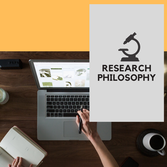Research Philosophy

I am interested in how youth gather and use information in our ever-changing world. Information takes varied forms for teens today and should be studied accordingly. As a middle-aged, middle class white woman studying for a PhD in information science, I understand that my study of youth culture must include youth perspective. For these reasons, I see myself as a qualitative researcher with an interest in understanding the world via the constructivist paradigm. Hatch explains that the researcher and participants in their studies "co-construct" reality together in this paradigm (15). As Denzin and Lincoln explain, the aim of inquiry is understanding. I believe that the interactions between people and things and the culture in which they are found.
I have taught and / or worked in K-12 schools since 1999 and understand that teens and tweens want to be heard and have their thoughts validated. Really, this is true for all people but I often read articles about teens without actually referencing what teens have to report for themselves. At the beginning of my studies, I read It’s Complicated (2014) by danah boyd about the role of social media in teens' lives. This was revolutionary for me. boyd’s book was informed by an ethnographic study of teens in communities throughout the country. It reported the role social media played in teen academic and social life and did not dwell solely on the negative impact. boyd states “I wrote this book to reflect the experiences and perspectives of the teens that I encountered. My hope is that this book will shed light on the complex and fascinating practices of contemporary American youth as they try to find themselves in a networked world (xi).” I, too, think life for teens is complex and fascinating and I want to try to understand the information seeking part of their lives through their eyes and not my own as their teacher. Knowing this helps me understand how to help school librarians help students in our schools. The lived experiences of our youth should serve as the foundation for effective library leadership and programming in public and school libraries.
Denzin and Lincoln, when discussing modern qualitative research, declare that qualitative researchers can no longer “directly capture lived experience. Such experience, it is argued, is created in the social text by the researcher (19).” Because I agree with Denzin and Lincoln, I believe in the sociocultural theory that experience is situated in context. This is true for learning. This is also true for anyone conducting field work collecting data, synthesizing it and then providing a summary of the findings. My understanding of what I am witnessing in the conduction of a qualitative study makes sense only in my educational context.
References:
Boyd, D. (2014). It's complicated: The social lives of networked teens. Yale University Press.
Denzin, N. K., & Lincoln, Y. S. (1994). Handbook of qualitative research. Sage publications, inc.
Hatch, A. J. (2002). Doing Qualitative Research in Education Settings. State University of New York Press.
I have taught and / or worked in K-12 schools since 1999 and understand that teens and tweens want to be heard and have their thoughts validated. Really, this is true for all people but I often read articles about teens without actually referencing what teens have to report for themselves. At the beginning of my studies, I read It’s Complicated (2014) by danah boyd about the role of social media in teens' lives. This was revolutionary for me. boyd’s book was informed by an ethnographic study of teens in communities throughout the country. It reported the role social media played in teen academic and social life and did not dwell solely on the negative impact. boyd states “I wrote this book to reflect the experiences and perspectives of the teens that I encountered. My hope is that this book will shed light on the complex and fascinating practices of contemporary American youth as they try to find themselves in a networked world (xi).” I, too, think life for teens is complex and fascinating and I want to try to understand the information seeking part of their lives through their eyes and not my own as their teacher. Knowing this helps me understand how to help school librarians help students in our schools. The lived experiences of our youth should serve as the foundation for effective library leadership and programming in public and school libraries.
Denzin and Lincoln, when discussing modern qualitative research, declare that qualitative researchers can no longer “directly capture lived experience. Such experience, it is argued, is created in the social text by the researcher (19).” Because I agree with Denzin and Lincoln, I believe in the sociocultural theory that experience is situated in context. This is true for learning. This is also true for anyone conducting field work collecting data, synthesizing it and then providing a summary of the findings. My understanding of what I am witnessing in the conduction of a qualitative study makes sense only in my educational context.
References:
Boyd, D. (2014). It's complicated: The social lives of networked teens. Yale University Press.
Denzin, N. K., & Lincoln, Y. S. (1994). Handbook of qualitative research. Sage publications, inc.
Hatch, A. J. (2002). Doing Qualitative Research in Education Settings. State University of New York Press.